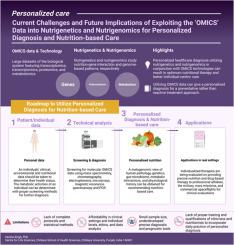Nutrition ( IF 3.2 ) Pub Date : 2023-02-10 , DOI: 10.1016/j.nut.2023.112002 Varsha Singh

|
Nutrigenetics and nutrigenomics, combined with the omics technologies, are a demanding and an increasingly important field in personalizing nutrition-based care to understand an individual's response to nutrition-guided therapy. Omics is defined as the analysis of the large data sets of the biological system featuring transcriptomics, proteomics, and metabolomics and providing new insights into cell regulation. The effect of combining nutrigenetics and nutrigenomics with omics will give insight into molecular analysis, as human nutrition requirements vary per individual. Omics measures modest intraindividual variability and is critical to exploit these data for use in the development of precision nutrition. Omics, combined with nutrigenetics and nutrigenomics, is instrumental in the creation of goals for improving the accuracy of nutrition evaluations. Although dietary-based therapies are provided for various clinical conditions such as inborn errors of metabolism, limited advancement has been done to expand the omics data for a more mechanistic understanding of cellular networks dependent on nutrition-based expression and overall regulation of genes. The greatest challenge remains in the clinical sector to integrate the current data available, overcome the well-established limits of self-reported methods in research, and provide omics data, combined with nutrigenetics and nutrigenomics research, for each individual. Hence, the future seems promising if a design for personalized, nutrition-based diagnosis and care can be implemented practically in the health care sector.
中文翻译:

将组学数据用于营养遗传学和营养基因组学以进行个性化诊断和基于营养的护理的当前挑战和未来影响
营养遗传学和营养基因组学与组学技术相结合,是个性化基于营养的护理以了解个体对营养指导治疗的反应的一个要求很高且越来越重要的领域。组学被定义为对以转录组学、蛋白质组学和代谢组学为特征的生物系统大数据集的分析,并提供对细胞调控的新见解。将营养遗传学和营养基因组学与组学相结合的效果将有助于深入了解分子分析,因为人类的营养需求因人而异。组学测量适度的个体内变异性,对于利用这些数据开发精准营养至关重要。组学与营养遗传学和营养基因组学相结合,有助于制定提高营养评估准确性的目标。尽管针对各种临床病症(例如先天性代谢病)提供了基于饮食的疗法,在扩展组学数据以更机械地理解依赖于基于营养的基因表达和整体调控的细胞网络方面取得了有限的进展。临床部门面临的最大挑战仍然是整合当前可用数据,克服研究中自我报告方法的既定局限性,并结合营养遗传学和营养基因组学研究为每个个体提供组学数据。因此,如果能够在医疗保健领域实际实施基于营养的个性化诊断和护理设计,未来似乎充满希望。克服研究中自我报告方法的既定局限性,并结合营养遗传学和营养基因组学研究为每个人提供组学数据。因此,如果能够在医疗保健领域实际实施基于营养的个性化诊断和护理设计,未来似乎充满希望。克服研究中自我报告方法的既定局限性,并结合营养遗传学和营养基因组学研究为每个人提供组学数据。因此,如果能够在医疗保健领域实际实施基于营养的个性化诊断和护理设计,未来似乎充满希望。































 京公网安备 11010802027423号
京公网安备 11010802027423号